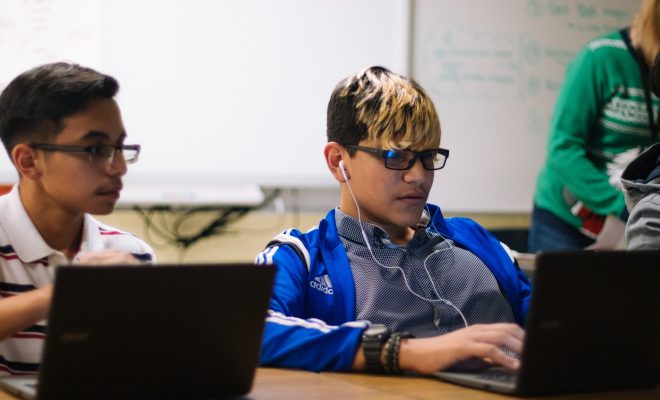A Healthy Education Puts Literacy First

For all the quibbling done about teaching more relevant skills (STEM is the go-to for this rhetoric) and better preparing students for productive careers and to compete on a global scale, America’s schools have done a disservice to the kinds of knowledge and skills whose value is unconditional, insulated from technological disruption, and intrinsic to success in all areas.
We talk about education as being critical to our economy, from filling the jobs of the future, supporting innovation, and even helping workers to pivot in their careers to keep up with change and keep the country competitive. Well, education is also important to the health of our country, and healthcare happens to be one of the biggest single drains on our national economy, in terms of both productivity and absolute cost.
If we are going to look to education for jobs, skills, and economic strength, it stands to reason that we’d also look to education for tackling the health challenges in our country as well.
Health literacy
One of the best predictors of academic success, is whether a student is encouraged to read–or, better yet, read to as a child–by his or her parents outside of school. Basically, this amounts to whether parents support literacy. In a sense, then, literacy can become cyclical: parents of active readers are, or become, active readers themselves; children of active readers are more likely to become active readers themselves, and to, in turn, encourage reading in their own children.
But basic literacy is no longer limited to reading and writing. Depending on who you talk to, everything from digital literacy to basic coding should be treated as equally essential–usually because of the economic impact such fundamental skills can make over time.
Health literacy needs a similar imperative, because as it turns out, health literacy correlates strongly with better health behaviors, more effective health treatment (when you understand your doctor’s orders, you are both more able and more likely to comply). Health, of course, underpins success elsewhere in life: careers, relationships, creativity, academics–all of the things, in short, we hope to gain from education.
Bad Medicine
Diet is but one component of this, but it is perhaps the easiest to blend practice with theory, considering the need for students to eat at least one meal over the course of their primary school day.
Hospitals and schools face a similar challenge: feeding students (or patients) well, and teaching them to feed themselves better at the same time. The cafeteria model that has gained such widespread adoption over the last century produces some serious externalities that, long-term, undermine any claims about the efficiency of such food service systems. Namely, prioritizing volume over value, and thereby reinforcing negative habits and attitudes about food: convenience first, fried and packaged rather than fresh, salt and sugar rather than balanced.
Putting health literacy on the menu, as well as in the classroom (or the examination room, where hospitals are concerned) can help undo these damaging trends. More than that, though, health literacy balances the role of authority–like doctors and nurses–with the role of individuals (take care of yourself proactively, rather than looking to get fixed reactively; don’t wait for government restrictions to improve your grocery list). Literacy itself teaches personal accountability: you learn to read and write for yourself, and to think and interpret critically.
Health literacy promises something similar, applied to the life skills of self-care and taking responsibility for each individual’s role in supporting population health.
Getting Physical
Balance is missing from our population, as well as from our schools. P.E. classes, like lunchrooms, could stand to reintegrate some balance to help repair our culture starting with the youth.
In other academic models, gamification is the latest buzzword to gain traction with its premise, essentially, of making learning engaging and fun. Physical education–training students to exercise, be active, and care for their bodies–seems a lot like the original model of gamification, but we’ve let the games overwhelm the lessons, and the competition dissolve the core value. We have a cultural problem when it comes to staying active.
Sports anchored to schools have more than their share of problems, and the association has grown beyond unhealthy. It is entirely possible that the professionalization of sports at all ages, and the pressure on children to specialize athletically at younger and younger ages, is partially responsible for the failure of physical education programs in the U.S. The intensity of the competition, and the emphasis on talent and relative skill over the intrinsic value of participation may well put kids off of sports, and by extension, exercise. It encourages kids of all ages to take unnecessary risks, “play through the pain” and even take drugs to gain a competitive edge.
Adopting the “everybody gets a trophy” approach is not helping. Physical fitness–and physical education–are the counterparts to the sort of health literacy training that can take place in the cafeteria. Again, the model of parents reading at home may be instructive. When participation in exercise of any form is reflected at home and at school, the focus can return to where it belongs: personal health and wellness.
Reading together promotes learning as well as fostering community. So, too, does eating together. There is no reason why athletics cannot provide a similar model for behavior as an individual as well as a group member.
Literacy underpins communication and helps us advance as individuals and collectively. Health literacy can do the same for our collective health and cultural approach to wellness by means of what we eat and how we care for ourselves.






